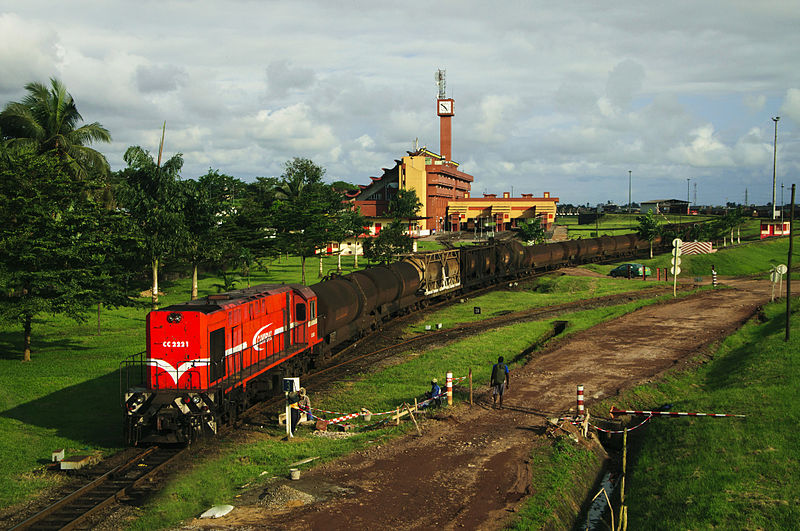 [1]
[1]位於喀麥隆最大港杜阿拉(Douala)的火車站。距離首都雅溫德(Yaounde)75公里的城市埃塞卡(Eseka)發生火車事故,而社群媒體在為該事故提供不同敘事觀點上,扮演了關鍵的角色。照片來源:Creative Commons photo by Z. NGNOGUE。
喀麥隆政府提出政策,欲打擊不為其所控的社群媒體,依據 [2]該國政府所控制的日報《喀麥隆論壇報》(Cameroon Tribune)的報導,這些社群媒體「已以飛快的速度發展成對和平的威脅以及操縱人民的秘密手段」,將造成「人性的毀滅、輿論的波動及事實的扭曲」。
該日報以雙語出刊,其特刊 [3]頭條《社群網站造成的惡性循環已達警戒程度》(Dérives sur les réseaux sociaux : la cote d’alert)強調:
A careful analysis of the situation tells of a phenomenon that is proving to be dangerous for society if no measures are taken to scale it down. This is important especially as elections are approaching. People with political ambitions may dive into it and use it to fight their opponents.
一項詳盡的研究分析指出,如果政府不加以作為,將會出現一種會危及社會的現象。隨著選舉將近,這個警訊尤為重要。擁有政治野心的人將可投入社群網站的經營,並藉此打擊對手。
政府的其他傳播機關,特別是喀麥隆國家廣播電台(Radio Télévision du Cameroun,CRTV),也於今(2016)年11月1日以法文 [4]與英文 [5]廣播發布消息,支持政府譴責社群網站散播負面思想的作法,並強調社群網站應受到管制。
為何此時開戰?
直接激怒政府的,是今年10月21日,在距離首都雅溫德約100公里的城市埃塞卡發生造成80人死亡、600餘人受傷的火車出軌事件 [6]。社群媒體用戶迅速地在第一時間享確切的災害資訊,公家機關和由國家擁有的傳統媒體卻沒能及時反應並公告消息。這場悲劇的相關照片和影片早就遍佈臉書、推特與其他社群媒體平台,反觀政府及喀麥隆鐵路公司 [7](Camrail,法國航運巨頭波洛萊(Bolloré)在喀麥隆興建鐵道的子公司),甚至否認 [8]發生出軌意外。
當政府官員最終承認 [9]火車發生意外時,社群媒體展現至關重要的功能,為該事故提供不同於官方的敘事觀點,例如解釋慘劇的發生可能與火車超載 [10]及中國製造的車廂故障 [11]有關,而非波洛萊承認的單純超速 [12]問題等。
又例如,推特用戶pahedipoula發布了某節超載車廂的照片及推文,並諷刺地談到:
#cameroun [13] #Eseka [14] “Dans le train, tout le monde était assis”@ #camrail [15]
J'adore l'humour des gens de #Bolloré [16] * pic.twitter.com/halgHOC89D [17]— Pahe (@pahedipoula) October 25, 2016 [10]
#Cameroon #Eseka. “Everyone was seated in the train” according to Camrail. I love the humor of the folks at #Bolloré”.
#喀麥隆 #埃塞卡 「火車裡所有人都是坐著的」 #喀麥隆鐵路公司
我覺得 #波洛萊 真是太幽默了
由於當地民眾在和朋友、父母交談,以及接受當地及國外媒體訪問時,其敘述的內容與官方資料有出入,社群網站也因而針對官方傷亡人數提出質疑 [18]。法國廣播電台(Radion France International, RFI)的互動節目Appels Actualité就推文表示,一位目擊者指正實際死亡人數應是政府公告人數的三倍:
#LT [19] Ruben “De visu il n'y a pas que 79 morts dans l'accident, il y en a au moins 200,250!” #Cameroun [20] #camrail [15] #appelsactu [21] @RFI [22]
— RFI Appels Actualité (@AppelsActu) October 25, 2016 [23]
#LT Ruben “From what I could see first-hand, there were not just 79 corpses, there were at least 200, 250!” #Cameroun #camrail #appelsactu @RFI
#LT Ruben「目測應該不只70人死於這場意外,應該至少200、250人!」 #喀麥隆 #喀麥隆鐵路公司 #appelsactu @RFI
更重要的是,不少喀麥隆人開始在社群網站上批評 [24]喀麥隆總統保羅‧比亞(Paul Biya)對這起慘案冷淡的態度─不只是因為事故當時人在瑞士的總統僅即時透過社群媒體 [25]發布影片慰問受害者,更因為他並未在事故發生後立即返國。(法語電視台VoxAfrica TV的報導 [26]針對社群媒體在此意外中所扮演的角色有更詳盡的分析。)
推特用戶237pleure抱怨道:
Drame tragique au cameroun*ou ést paul biya?Sans doute dans un Hotel de luxe à geneve en train de se payer la tete des camerounais.** pic.twitter.com/s1RkmJW7l0 [27]
— 237pleure* (@237pleure) October 23, 2016 [28]
Tragedy in Cameroon. Where is Paul Biya? No doubt in a luxury hotel in Geneva making fun of Cameroonians.
這真是喀麥隆的悲劇。但保羅‧比亞在哪啊?毫無疑問地,他一定是在日內瓦的高級旅館裡嘲弄喀麥隆人吧。
當比亞總統在瑞士宣布當日為喀麥隆全國哀悼日,推特用戶Yannick T推文痛批:
@PR_Paul_Biya [29] en dehors de cela tu sais faire quoi encore ? N'importe quoi. Tu es devenu le président de l'hôtel continental à Genève,fiasco
— Yannick T (@yannickt34) October 23, 2016 [30]
What else do you know how to do aside from this? You have become the President of the Intercontinental Hotel in Geneva. What a fiasco.
保羅‧比亞總統,除此之外你不知道該做些什麼嗎?反正你已早就成了日內瓦飯店的總統了,丟臉透了。
隨著總統遭指責 [31]怠忽職守、無能、又漠不關心,喀麥隆政府反而自稱受害者 [32]:
Le sinistre d’Eséka s’est vite transformé pour certains en défouloir, un alibi commode, un exutoire rêvé pour asséner des coups, porter l’estocade, assouvir des appétits bassement politiciens… Des déclarations qui ne visaient manifestement qu’un seul objectif : accabler, embarrasser au maximum le chef de l’Etat et en tirer les dividendes politiques conséquents.
Some individuals quickly transformed the Eseka disaster into a convenient alibi, an ideal outlet to strike, to deal the death blow and satisfy their despicable political appetites… [Their] statements obviously had a single objective: overwhelm and embarrass the President of the Republic to the maximum, and benefit from the political fallout.
這場在埃塞卡的悲劇,很快地,已被有心人士轉變成一種發洩的管道,一種方便的藉口,一種夢寐以求的出口,用以給予政府沉重的打擊,來滿足這些胃口大開的卑鄙政客…那些言論顯然針對一個目標而來:壓倒並極大化地羞辱我們的國家元首,同時取得隨之而來的政治利益。
意外發生數日後的記者會中,該國通訊部發言人Issa Tchiroma反擊 [33]道:
Les gens de l’internet sont en permanence fâchés… c’est leur nature… les réseaux sociaux ne nous inquiètent pas. C’est un espace qu’il faut rationnellement occuper.
Internet users are constantly angry… it is their character… we are not bothered by social media. In any case, it is a space that we have to logically occupy.
那些網路用戶持續地表達其怒火…這是他們的本性…我們並不擔心社群網站,但無論如何,這是一個需要理性管理的空間。
新型恐怖主義
11月10日喀麥隆人民議會發言人Cavaye Djibril於議會發表談話 [34],抱怨社群媒體所造成的社會動盪,甚至將其比喻為「新型恐怖主義」,顯示反社群媒體的政策格局已提高:
Social media… is now being used for misinformation, and even intoxication and manipulation of consciences thereby instilling fear in the general public. In fact, it has become as dangerous as a missile… In a nutshell, social media has become a real social pandemic in Cameroon… I urge the appropriate authorities to see the pressing need to track down and neutralize the culprits of cybercrimes… we should know that there is a limit to freedom, for freedom without limit stifles freedom.
今日的社群媒體,藉由灌輸民眾恐懼的思維,用以傳遞錯誤訊息,同時使社會風氣糜爛,良知受到操縱。事實上,它們已變得和飛彈一般危險…簡而言之,社群媒體已變成喀麥隆社會的流行病症…我在此促請各有關當局採行迫切的措施以定位、制伏這些網路犯罪的肇事者…我們必須知道自由仍須有個界線,畢竟沒有限制的自由就會殘害自由了。
此番談話似乎確認了長久以來的推測 [35] ,亦即政府準備以法令限縮社群媒體的言論自由。
對於社群媒體的傳統敵意與懷疑
這波對於網路、並特別針對社群網站而來的攻擊早就不是新聞。喀麥隆政府其實有著對虛擬世界抱持深刻敵意 [36]的政治傳統。
2014年,該國國家資通訊科技局(l'Information et de la Communication,l'ANTIC)總幹事即透漏 [37],該單位長期監控社群網站以偵測對該國國家安全有威脅的內容及圖像。
2015年,比亞總統本人也在發表他一年一度的青年日演說 [38]時,警告民眾勿以網路操縱輿論:「不要被那些邪惡的小鳥(註:推特圖示)、癡人說夢的編造者及樂於藉由社群媒體在虛擬世界高談闊論而使社會動亂的狂熱者所誤導。這些不負責任的預言家們只是熱衷於操控你們罷了。」
今年4月,總統對他的內閣成員們下令 [39],對社群網站應採取更積極主動的傳播策略。這項轉變的導火線是今年3月的醜聞 [40]:一名懷孕女性Monique Koumateke由於無力支付醫療費用而遭地區醫院拒收,後來因延誤就醫致死。事件爆發後,各社群網站用戶紛紛對此表示憤慨。然而,成立於巴黎的週報《青年非洲》(Jeune Afrique)的報導 [41]指出,截至今年4月止,喀麥隆政府僅有6位部長級官員擁有個人官方臉書,其中也僅2人同時擁有推特帳號。總統的命令只達到了有限的效果,主要是因為政府總是在回應輿論,而不是創造輿論。
喀麥隆的社群媒體規範
雖然喀麥隆並沒有專門規範社群媒體的法令,但是,該國於2010公佈了一份與網路安全及網路犯罪相關的法案 [42] ,其中即包涵了兩個有關制裁線上活動的關鍵條文。
第77條規定:
(1) Whoever uses electronic communication or an information system to act in contempt of race or religion shall be punished with imprisonment for from 02 (two) years to 05 (five) years or a fine of from 2 000 000 (two million) to 5 000 000 (five million) CFA francs or both of such fine and imprisonment.
(2) The penalties provided for in Subsection 1 above shall be doubled where the offence is committed with the aim of stirring up hatred and contempt between citizens.
(1)使用電子通訊或資訊系統而犯下種族或宗教歧視者,處有期徒刑2至5年,得易科罰金2百萬至5百萬非洲法郎,或刑期與罰金併行。
(2)前項之規定,以故意煽動國民之間仇恨與蔑視者,得加重其刑至雙倍。
第78條規定:
(1) Whoever uses electronic communications or an information system to design, to publish or propagate a piece of information without being able to attest its veracity or prove that the said piece of information was true shall be punished with imprisonment for from 06 (six) months to 02 (two) years or a fine of from 5,000,000 (five million) to 10,000,000 (ten million) CFA francs or both of such fine and imprisonment.
(2) The penalties provided for in Subsection 1 above shall be doubled where the offence is committed with the aim of disturbing public peace.
(1)使用電子通訊或資訊系統而設計、發布或傳遞未經證實的消息或無法證實該消息之真偽者,處有期徒刑6個月至2年,得易科罰金5百萬至1千萬非洲法郎,或刑期與罰金併行。
(2)前項之規定,以故意妨礙社會秩序者,得加重其刑至雙倍。
對網路及社群媒體的使用率攀升
依計算各國與全球網路流量的網站Internet World Stats(IWS)統計,至今年6月止,喀麥隆約有430萬網民 [43],網路普及率則約為17.7%(相較之下,2013年的普及率 [44]僅6.4%)。
根據法國數據監測公司Médiamétrie近期的研究 [45],臉書是喀麥隆最受歡迎的社群媒體平台(IWS估計該國臉書用戶 [46]約210萬),緊追在後的是Google+,Instagram,推特和領英網(LinkedIn)。該研究亦指出73.3%介於15至24歲的年輕人擁有社群媒體帳號。
社群媒體日漸成為那些欲推動國家革新的改革者們的匯聚點。毫無意外地,比亞政權(Biya regime)視其為一個足以顛覆國家的平台,絕不能疏於審查。
L’Etat du #Cameroun [20] s’est résolument engagé dans une lutte contre les réseaux sociaux, afin de préserver l'image du pays pic.twitter.com/L9zZGKnMsg [47]
— #AFRICA24 (@AFRICA24TV) November 14, 2016 [48]
The State of Cameroon is resolutely committed to the fight against social media so as to preserve the image of the country.
喀麥隆政府決心致力於一場和社群網站的交戰,以維持國家形象。
對比亞政權而言,社群媒體用戶若想繼續在線上發表言論,不是應該選擇被政府收編,就是應該乖乖就範。
校對:FangLing